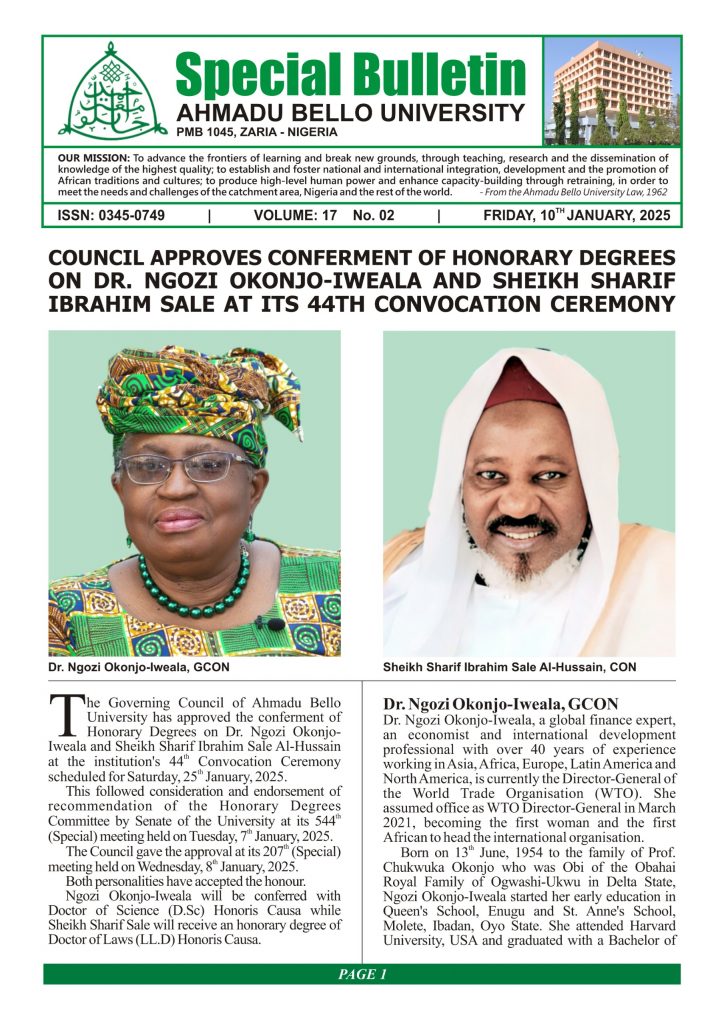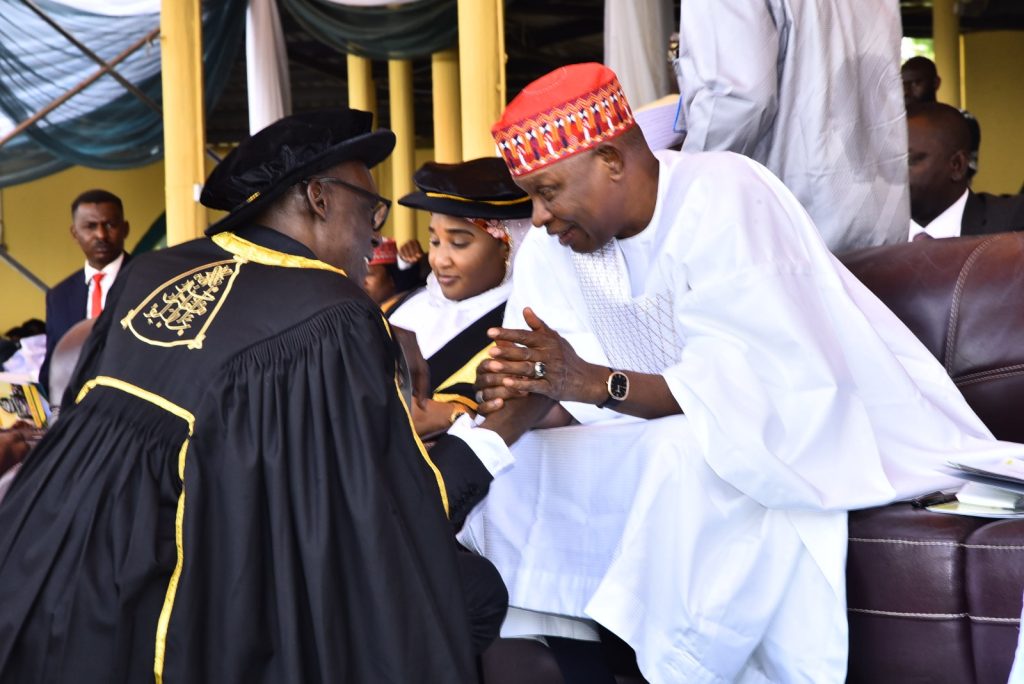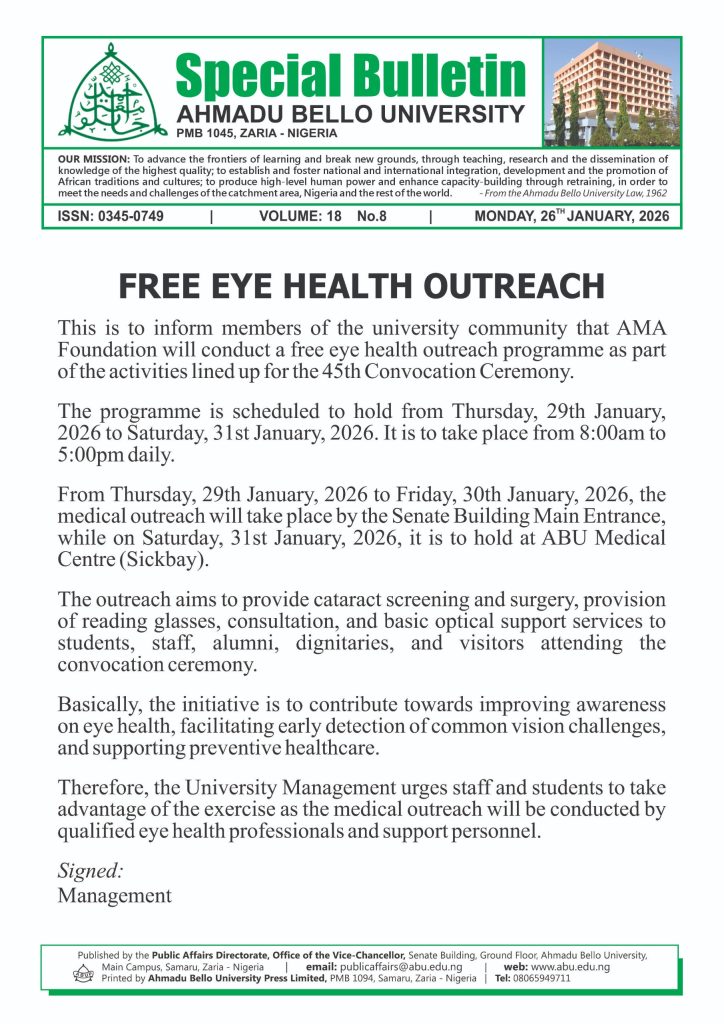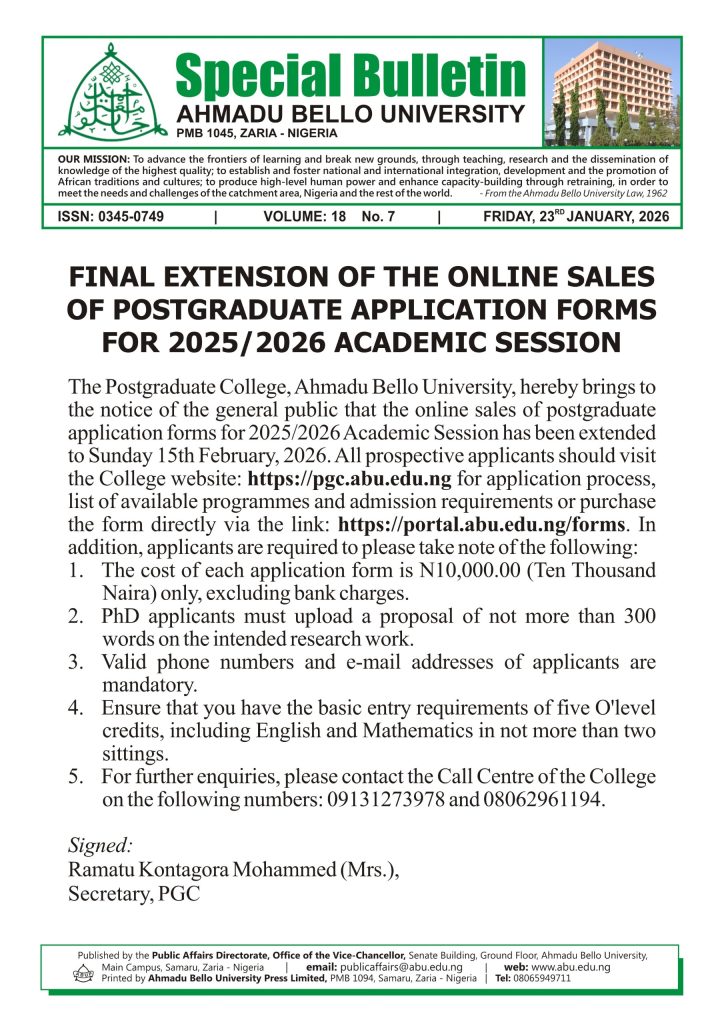ABU to confer Honorary Degrees on Ngozi Okonjo-Iweala, Sheikh Sharif Ibrahim Sale
. . . At its 44th Convocation billed for 25th January, 2025The Governing Council of Ahmadu Bello University has approved the conferment of Honorary Degrees on Dr. Ngozi Okonjo-Iweala and Sheikh Sharif Ibrahim Sale Al-Hussain at the institution’s 44th Convocation Ceremony scheduled for Saturday, 25th January, 2025.
This followed consideration and endorsement of recommendation of the Honorary Degrees Committee by Senate of the University at its 544th (Special) meeting held on Tuesday, 7th January, 2025.
The Council gave the approval at its 207th (Special) meeting held on Wednesday, 8th January, 2025.
Both personalities have accepted the honour.
Ngozi Okonjo-Iweala will be conferred with Doctor of Science (D.Sc) Honoris Causa while Sheikh Sharif Sale will receive an honorary degree of Doctor of Laws (LL.D) Honoris Causa.
Dr. Ngozi Okonjo-Iweala, GCON
Dr. Ngozi Okonjo-Iweala, a global finance expert, an economist and international development professional with over 40 years of experience working in Asia, Africa, Europe, Latin America and North America, is currently the Director-General of the World Trade Organisation (WTO). She assumed office as WTO Director-General in March 2021, becoming the first woman and the first African to head the international organisation.
Born on 13th June, 1954 to the family of Prof. Chukwuka Okonjo who was Obi of the Obahai Royal Family of Ogwashi-Ukwu in Delta State, Ngozi Okonjo-Iweala started her early education in Queen’s School, Enugu and St. Anne’s School, Molete, Ibadan, Oyo State. She attended Harvard University, USA and graduated with a Bachelor of Arts in Economics in 1976 and obtained a PhD in Regional Economics and Development in 1981 from the Massachusetts Institute of Technology, USA.
Dr. Okonjo-Iweala served twice as Nigeria’s Finance Minister (2003–2006 and 2011–2015) and briefly acted as Foreign Minister in 2006. She was the first woman to hold both positions. During her first term as Finance Minister in the administration of President Olusegun Obasanjo, she spearheaded negotiations with the Paris Club that led to the wiping out of US$30 billion of Nigeria’s debt, including the outright cancellation of US$18 billion. In 2003, she led efforts to improve Nigeria’s macroeconomic management, including implementing an oil-price-based fiscal rule. Revenues accruing above a reference benchmark oil price were saved in a special account, the Excess Crude Account, which helped to reduce macroeconomic volatility. Okonjo-Iweala was also instrumental in helping Nigeria obtain its first-ever sovereign credit rating (of BB minus) from Fitch Ratings and Standard & Poor’s in 2006. She also introduced the practice of publishing the Federal, State, and Local Government shares of revenue from the country’s Federal account. That action went a long way in increasing transparency in governance at all levels of government.
In 2011, Okonjo-Iweala was re-appointed as Minister of Finance in Nigeria with the expanded portfolio of the Coordinating Minister for the Economy by President Goodluck Jonathan. Her legacy included strengthening the country’s public financial systems that enhanced transparency of government accounts, strengthened institutions against corruption and stimulated the housing sector with the establishment of the Nigerian Mortgage Refinance Corporation (NMRC) in 2013. Under her leadership, the National Bureau of Statistics carried out a re-basing exercise of the Gross Domestic Product (GDP), the first in 24 years, which saw Nigeria emerge as the largest economy in Africa. She also empowered women and youth with the Growing Girls and Women in Nigeria Programme (GWIN), a gender-responsive budgeting system, and the highly acclaimed Youth Enterprise with Innovation Programme (YouWIN) to support entrepreneurs that created thousands of jobs.
Dr. Okonjo-Iweala had a 25-year career at the World Bank, as a development economist and rose to the position of Managing Director (Operations) with the responsibility for the World Bank’s $81 billion operational portfolio in Africa, South Asia, Europe, and Central Asia. Okonjo-Iweala spearheaded several World Bank initiatives to assist low-income countries during the 2008–2009 food crises and later during the financial crisis. In 2010, she was the chairperson of the IDA replenishment, the World Bank’s successful drive to raise $49.3 billion in grants and low-interest credit for the poorest countries in the world.
After leaving government, Dr. Okonjo-Iweala became a member of the International Commission on Financing Global Education Opportunity (2015–2016), and the Eminent Persons Group on Global Financial Governance, which was established by the G20 Finance Ministers and Central Bank Governors (2017–2018). From 2014, she has been co-chairing the Global Commission for the Economy and Climate. She also served as Chair of the Board of Gavi, the Vaccine Alliance (2016–2020).
She belongs to many international organisations and corporate bodies as well as non-profit organisations.
Sheikh Sharif Ibrahim Sale Al-Hussain, CON
Sheikh Sharif Ibrahim Sale Al-Hussain, who was born on 12th May, 1938 in Aredibe near Dikwa, Borno State, rose from a humble beginning to become a world-class scholar in different aspects of Islamic scholarship such as Qur’anic Studies, religious sciences, logic, philosophy and rhetoric. He wrote more than 500 books and pamphlets as well as hundreds of commissioned conference papers.
Unlike most of his contemporaries, Sheikh Ibrahim Sale has maintained the uneasy balance between the adoption of a modern approach to religious scholarship and embracing the age-old Islamic tradition of evaluation and certification of scholars. It was in this context that his attempts to compare notes and rub minds with other scholars, as well as to submit himself to them for rigorous scrutiny, that he attended many prestigious centres of Islamic scholarship and learning far beyond the shores of Nigeria and the African continent.
He was a regular member of all the committees established to advise or guide government on some of its policies that had religious implications or relevance. He was also a familiar face on all government delegations of religious leaders sent to some Arab and Muslim countries such as Saudi Arabia, Iran, Egypt, Turkey, Libya, Morocco, Malaysia, Indonesia, Pakistan, Senegal, Iraq, and Sudan.
His main areas of academic interest and research include: Qur’anic Sciences, Prophetic Tradition, History, Philosophy, Islamic Jurisprudence, Islamic Finance and Banking, Astronomy, Arabic Literature, Science of Sufism, Islamic Polity, Islamic Law of Personal Status & Inheritance, Peaceful Coexistence between Nation States and many other sundry issues that border on the essence of humanity and personal liberty.
It is interesting to note that Sheikh Sharif Ibrahim Saleh spent only two decades (1944-1964) as a student and underwent all his training in Nigeria where he received training from both Nigerian and foreign teachers. He was a homegrown scholar, produced locally through the mechanism of the Tsangaya system, but proudly of international standard. It was the local training he received that provided him with the requisite competence and the confidence to compete internationally and be recognized with respect as an excellent scholar.
He has also been invited severally to conduct Tafsir at the State House, Lagos during Ramadan by different Heads of State; and he belongs to many international organisations.
…………………….
Public Affairs Directorate,
Office of the Vice-Chancellor,
Ahmadu Bello University, Zaria
Wednesday, 8th January, 2025



